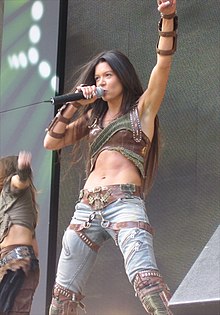| Revision as of 16:54, 15 March 2006 editAdrianwill (talk | contribs)25 editsNo edit summary← Previous edit | Revision as of 16:55, 15 March 2006 edit undoAdrianwill (talk | contribs)25 editsNo edit summaryNext edit → | ||
| Line 1: | Line 1: | ||
| ] | ] | ||
| '''Wild Dances''' ({{Lang-uk|Дикі танці|Dyki tantsi}}) is the name of the song by ] pop-star Ruslana Lyzhichko (]). Ruslana performed the song at the ] in ]. After qualifing from the semi-final, in which it had in fact been narrowly outscored by ]'s entry "Lane moje", the song turned the tables in the final, and the 280 points it received were sufficient to claim a famous Eurovision victory for ]. | '''Wild Dances''' ({{Lang-uk|Дикі танці|Dyki tantsi}}) is the name of the song by ] pop-star Ruslana Lyzhichko (]). Ruslana performed the song at the ] in ]. After qualifing from the semi-final, in which it had in fact been narrowly outscored by ]'s entry "Lane moje", the song turned the tables in the final, and the 280 points it received were sufficient to claim a first famous Eurovision victory for ]. | ||
| With a mixture of ] and ] lyrics, "Dyki tantsi" had the distinction of becoming the first Eurovision winner to be sung at least partly in a language other than English since the rule-change of 1999, when countries were allowed to sing in a language of their choosing, rather than one of their official languages. | With a mixture of ] and ] lyrics, "Dyki tantsi" had the distinction of becoming the first Eurovision winner to be sung at least partly in a language other than English since the rule-change of 1999, when countries were allowed to sing in a language of their choosing, rather than one of their official languages. | ||
Revision as of 16:55, 15 March 2006

Wild Dances (Template:Lang-uk) is the name of the song by Ukrainian pop-star Ruslana Lyzhichko (Ruslana). Ruslana performed the song at the Eurovision Song Contest 2004 in Turkey. After qualifing from the semi-final, in which it had in fact been narrowly outscored by Serbia and Montenegro's entry "Lane moje", the song turned the tables in the final, and the 280 points it received were sufficient to claim a first famous Eurovision victory for Ukraine.
With a mixture of English and Ukrainian lyrics, "Dyki tantsi" had the distinction of becoming the first Eurovision winner to be sung at least partly in a language other than English since the rule-change of 1999, when countries were allowed to sing in a language of their choosing, rather than one of their official languages.
The song was remembered for an energetic performance, which Ruslana gave in a leather outfit, inspired by ethnic tradition of Ukraine.
Facts
- The song peaked at #1 in the Belgium UltraTop 50 and #3 in the UltraTop 50 year end chart.